In the modern day, mobile data is almost a necessity for consumers as phones become a ubiquitous part of our lives.
In response, many telcos in Singapore have begun offering larger packets of data in their mobile plan offerings to cater to data-heavy users. Gone are the days where data offerings were denominated in megabytes; now they are listed in gigabytes, which is a testament to the importance of mobile data for consumers.
But as competition for how much data consumers get became stale, one particular telco began offering consumers the option of doing something different with their data.
Founded in 2019, Gorilla Networks married two concepts that seemed to have nothing to do with each other: mobile data and cryptocurrency.
Founder and CEO Xanne Leo was inspired by how mobile plans in Singapore were inflexible, requiring users to accurately predict their monthly usage and data consumption.
She resolved to have her telco offer users a new type of mobile plan — one that would allow users to pay only for what they used, and convert the rest into digital assets like cryptocurrency and NFTs.
Globalising offerings

Recently, Gorilla Networks has been acquired by New York Stock Exchange-listed Society Pass (SoPa), a Vietnamese loyalty and data-focused marketing platform in Southeast Asia and South Asia.
Our proprietary blockchain technology aligns well with SoPa’s acquisition strategy. As we work in tandem with Society Pass to incorporate Gorilla’s blockchain and Web3 capabilities, we aim to enable a new meta economy for our users, alongside SoPa’s portfolio companies.
– Xanne Leo, founder and CEO of Gorilla Networks
This acquisition is intended to leverage SoPa’s existing platform and connections, and enable Gorilla Networks to expand their customer base into regions where SoPa is active.
According to Gorilla Networks, it plans to expand their user base into Vietnam, Thailand, and Malaysia within the next 12 months.
“We chose these countries in view of SoPa’s extensive ecosystem and large user base in SEA. In addition, SoPa operates Leflair.com, Vietnam’s leading lifestyle e-commerce platform; Pushkart.ph, a popular grocery delivery company in Philippines; and Handycart.vn, a leading online restaurant delivery service based in Hanoi, Vietnam,” she explained.
“By joining forces with SoPa’s in these regions, Gorilla is thrilled about the combined marketing capabilities we will now bring collectively to our partners and customers. Through Gorilla’s cutting-edge technology, we seek to tailor for an unprecedented experience for the next generation of customers in SEA and to enable a new meta economy for our users.”
In addition, Gorilla’s ambitions go beyond just engaging more customers in the region. They are building themselves to become a Global Metaverse Connectivity Operator, meaning that they aim to onboard traditional telcos into the metaverse, through their established Web3 ecosystem.
Moving the telco ecosystem into Web3
Gorilla Networks has already proven their concept in its Web3 telecommunications capabilities with GSIM, which functions as an eSIM preloaded with roaming mobile data.
Their upcoming offering, the GLVT NFT, will act as Gorilla’s membership NFT and introduce what Web3 has to offer for those still on Web2 networks.
Gorilla Networks also has plans to introduce GMobile NFTs, as well as SIMs, mobile data plans and NFTs. These will function as Gorilla’s on-chain connectivity objects to provide owners access to mobile data across the globe. Users will also be able to top up their mobile data to GMobile NFT, transfer the NFT to another wallet, and reissue new SIMs when needed.
Telecommunication companies have always been centralised, walled gardens where users do not have seamless access to essential telecommunication services worldwide.
Users do not normally associate possession of SIMs, phone numbers, talktime, SMS, mobile data and other network services with true ownership in the sense of freedom to trade or transfer.
– Xanne Leo, founder and CEO of Gorilla Networks
As such, Gorilla Network’s goal is to innovate and improve on what consumers generally think of when they consider telcos. She wants to allow them to appreciate that they truly own their phone number, and make it a point that SIMs and NFTs are really just an extension of their identities.
At the same time, Gorilla Network is also conscious of their customers’ needs for privacy when entering the NFT space, and is planning to operate a Web3-native on-chain verification vouch with an off-chain trusted verification bridge. This would enable customers to be verified while keeping their on-chain identity private to other users.
While Gorilla Network has already made its mark in Singapore with its innovative approach to mobile data plans, it seems that the company is not yet prepared to simply hold the position it has.
Gorilla Network has leveraged its reputation and technology, and can now aspire to be something greater than a local telco as it brings NFTs and the metaverse to ordinary customers not just in Singapore, but throughout the region.
Featured Image Credit: Gorilla Networks
Also Read: New S’pore MVNO Gorilla Mobile lets you turn unused mobile data into digital crypto tokens










